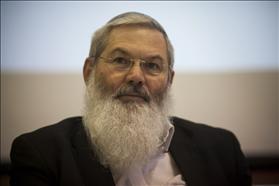They cornsertone of civil society
Hiddush report demonstrates dire need to close the gender gap in Israel's religious councils
Hiddush CEO Rabbi Uri Regev turned to the Ministry of Religious Services to emphasize the need for proper implementation of gender equality in Israel's religious establishment
11/02/2014 11:50
Tags: gender equality · religious councils · Ministry of Religious Services

Rabbi Eli Ben-Dahan, “Habayit HaYehudi”. 1/06/2013. Photo: Yonatan Sindel, Flash 90
This past summer, Leah Biton made headlines as the first woman to be appointed to head one of Israel's religious councils. While this appointment was a breakthrough for women's representation in Israel's religious establishment, it reminds us that we are still far from achieving gender equality in Israel's public and religious institutions and must continue to work to ensure its proper realization.
Addressing this worrisome reality, Hiddush turned to Religious Services Minister Naftali Bennett, Deputy Religious Services Minister Rabbi Eli Ben Dahan, and Israel's Attorney General Yehuda Weinstein in a letter highlighting the inadequate representation of women in the religious councils. The letter was co-signed by several other like-minded organizations, such as, Mavoi Satum, The Center for the Advancement of Women in the Public Sphere, the Women's Parliament, and the Shin Movement for Equal Representation of Women.
In the letter, Hiddush called on these three officials to fully implement the core principle of gender equality as established in Israeli legal and judicial precedents, and as has been hailed by the current government coalition. Hiddush also sent the ministers and the Attorney General our report on the status of women in Israel's religious councils to emphasize and establish the need for the government to assume responsibility and act on this disparaging gender gap.
We are still far from achieving gender equality in Israel's public and religious institutions and must continue to work to ensure its proper realization
The report found that in the past 23 years since the landmark Supreme Court decisions that paved the path for greater representation of women in public institutions, including religious administrative bodies such as religious councils, only 27 women out of some 450 have served on religious councils. Their representation makes up only 6% of the councils' members!
There have been recent developments that promote women's involvement in Israel's religious establishment, which may indicate a change in attitude toward the inclusion of women. In addition to Ms. Biton's appointment as head of the Akko Religious Council, a bill was passed in the past year to increase the number of women who sit on the government committee tasked with selecting rabbinical judges. There were also a greater number of women who took part in the selection process of Israel's Chief Rabbis last summer. The Ministry of Religious Services also announced that following lengthy legal battles, women will finally be allowed to serve as state-paid kosher supervisors.
However, in light of the disparaging figures that were presented to the Ministry of Religious Services about equal gender representation, Hiddush will continue to monitor the relevant government ministries to ensure adequate representation of women on religious councils -- just as they are gaining by right such representation in a number of other public entities.